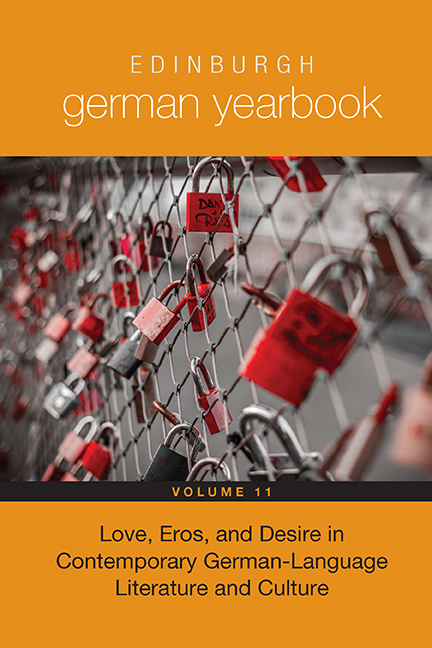 Edinburgh German Yearbook 11
Edinburgh German Yearbook 11 Introduction: Love, Literature, (Post-)Modernity: On the Re-Emergence of Love in Contemporary German Literature
Published online by Cambridge University Press: 21 August 2019
Summary
Helmut Schmitz, University of Warwick
I've looked at love from both sides now
From give and take
And still somehow
It's love's illusions I recall
I really don't know love at all
—Joni MitchellIN HIS ESSAY “On Some Motifs in Baudelaire,” Walter Benjamin comments on the concept of experience in Bergson's Matière et Memoire that the reader “is bound to conclude that only a poet can be the adequate subject of such an experience.” One is tempted to make a similar claim with respect to the phenomenon of love. While it would be foolish to claim that only a poet might be an adequate subject for the experience of love, it is certainly possible to say that s/he might be the adequate subject to give voice to this experience. In other words, it is poetry, or literature in general, that is perceived as the “adequate” form of expression of love's qualities. From the Middle Ages to the middle of the nineteenth century, literature is the dominant medium through which ideas and experiences of love find expression, at first through poetry, and, in the bourgeois age over the last two centuries, increasingly through fiction. Niels Werber points to the historically shared semantics between the terms “love” and “novel”: “Der Roman handelt also von der Liebe, aber auch umgekehrt bezeichnet man Liebesabenteuer als ‘Roman.’ Gattung und Sujet sind derart verknupft, dass der Begriff ‘Roman’ beide zu bezeichnen vermag.” Describing literary representations and literature on love as a “model” for lovers in society, Elke Reinhardt-Becker claims that love is the favorite topic of literature. Matthias Luserke-Jacqui comments at the end of his Kleine Literaturgeschichte der großen Liebe: “Liebe braucht Literatur.”
The historical, literary, and social field of love is too vast to be adequately summarized here; this introduction will therefore cast a light on a number of issues addressed by the chapters in this volume without attempting to be exhaustive. In the first instance, it is worth noting that the fields of literature, culture, and social theory are closely intertwined when it comes to the phenomenon of love, as a number of sociotheoretical studies either take their cue entirely from literary works or closely refer to literary or cultural models for their formation of central concepts.
- Type
- Chapter
- Information
- Edinburgh German Yearbook 11Love, Eros, and Desire in Contemporary German-Language Literature and Culture, pp. 1 - 22Publisher: Boydell & BrewerPrint publication year: 2017
- 2
- Cited by
